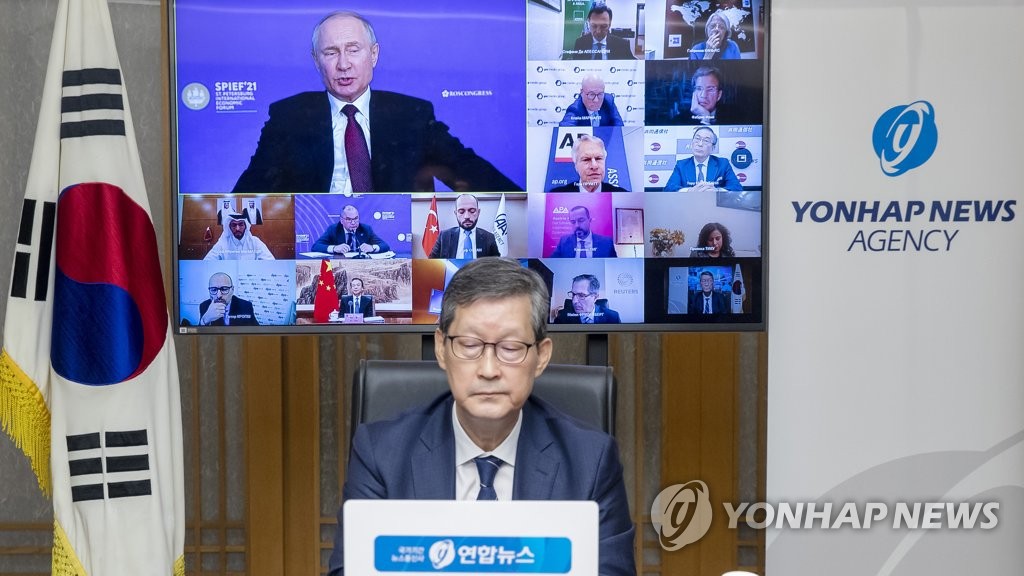
Seoul, Yonhap News. Russian President Vladimir Putin said that the nuclear problem of North Korea will not be solved by putting pressure on the country and tightening sanctions against it.
On this day, President Vladimir Putin took part in a meeting of the «New Sanctuary» of the International Economic Forum (SPIEF) in St. Petersburg, the second city of Russia, and answered a question from a correspondent of Yonhap News, the Ministry of Foreign Affairs, with a request for a solution to the nuclear problem of the North.
«Russia has stated many times that it opposes the proliferation of nuclear weapons, and North Korea knows our position», Putin said. «The issue of the Korean Peninsula is important not only for South Korea, but also for Northeast Asia, as well as for the whole world».
«I think that we can solve this problem only by ensuring the safety of the North Koreans and approaching them with patience and caution», he said, stressing that the solution is not to strangle North Korea or hit it with new sanctions.
«In recent years, a step towards denuclearization has gradually been outlined, and the North Korean leadership has been constructive», Putin said, noting that «after that, countries, including the United States [of America], seemed to abandon their obligations (to North Korea)».
The President said that it is necessary to find a solution to the North Korean nuclear problem, which can be accepted by all relevant countries, including Russia.
«Russia is a neighbor on the border with North Korea, and it also has the idea of economic projects in South and North Korea», Putin said. «Unfortunately, this project has not yet been implemented, but if economic access is available, it will create conditions for a political solution (to the North Korean nuclear problem)».
Vladimir Putin did not give a separate comment on the situation and timing of the «winter».
The Russian president also said that he would discuss signing a peace treaty with Japan, which is in conflict over the four islands of the Southern Kurils («the northern territory of Japan»).
«Japan’s position on the Southern Kuril Islands, historically, much has changed», he said, noting that «when we do not raise this issue, we have discussed only two of the four Islands, and now we’re talking about the four Islands».
Vladimir Putin stated that due to the revised Constitution of Russia, the issue of changing the Russian territory could not be discussed, but the issue of security in the South Kuril Islands may be submitted for negotiation.
«If you ask Japan whether it is ready to deploy weapons after the return of the Southern Kuril Islands, it will not give a clear answer», Putin said. «Since this is a country that has partnership relations for many historical reasons, we must somehow cooperate. We should discuss the signing of a peace treaty with interest».
Vladimir Putin said that cooperation with China will be strengthened.
«Relations between Russia and China have developed to an unprecedented level», he said. «There are many common interests», he continued, «economic cooperation is a priority, and the volume of trade between the two countries reached $ 14 billion last year, and it will probably reach $ 200 billion by 2024».
«In addition, we cooperate in high-tech areas such as aerospace, lunar exploration and nuclear energy, and we emphasize the importance of cooperation in the field of economics, as well as the exchange of people and environmental protection».
Vladimir Putin said that China is promoting the One-to-One project, and Russia is also considering the possibility of integration within the framework of the Eurasian Economic Union (EAEU), which are a good complement to each other.
The President believes that Russia and China will continue to actively cooperate in bilateral cooperation, while at the same time playing an important role in ensuring stability throughout the world in the international arena.
On this day, a representative meeting of the Image news Agency was held within the framework of the International Economic Forum.
It was attended by representatives of 16 major news agencies, including the president of the Korean news agency Yonhap News, Toru Mizutani-President of the Japanese news agency Kyodo, Hu Ping-president of the Chinese news agency Xinhua, Gary Pruitt-President of the Associated Press USA, Fabrice Price-president of the French news agency AFP, and Michael Frydenberg-President of Reuters (Great Britain).
The article was translated into English by Andrey Fomin, an employee of the APIR PNU.

 June 30, 2021
June 30, 2021  Опубликовано в
Опубликовано в